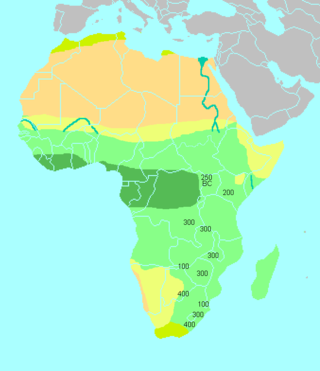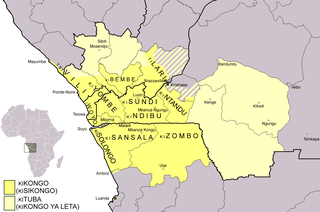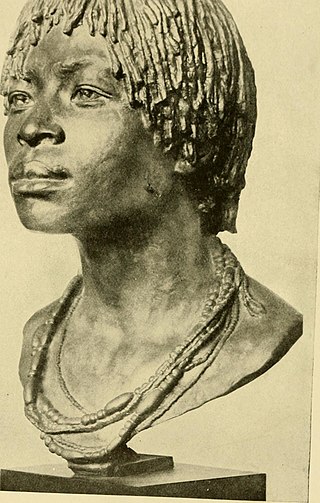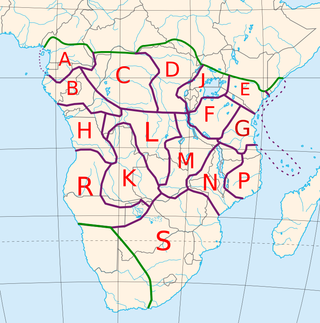Related Research Articles

Congo may refer to:
The history of Zambia experienced many stages from colonization to independence from Britain on October 24, 1964. Northern Rhodesia became a British sphere of influence in the present-day region of Zambia in 1888, and was officially proclaimed a British protectorate in 1924. After many years of suggested mergers, Southern Rhodesia, Northern Rhodesia, and Nyasaland were merged into the British Federation of Rhodesia and Nyasaland.

The Bantu expansion is a hypothesis about the history of the major series of migrations of the original Proto-Bantu-speaking group, which spread from an original nucleus around West-Central Africa. In the process, the Proto-Bantu-speaking settlers displaced, eliminated or absorbed pre-existing hunter-gatherer and pastoralist groups that they encountered.
Kaonde (kiiKaonde) is a Bantu language spoken primarily in Zambia but also in the Democratic Republic of the Congo. Kaonde and its dialects are spoken and understood by perhaps 350,000 people or more. It is estimated that approximately 2.3% of Zambians are native Kaonde speakers. Kaonde speakers overwhelmingly live in the Northwestern and parts of Central regions of Zambia.
Lu(u)nda or Ruund may refer to:

Kongo or Kikongo is one of the Bantu languages spoken by the Kongo people living in the Democratic Republic of the Congo (DRC), the Republic of the Congo, Gabon, and Angola. It is a tonal language. The vast majority of present-day speakers live in Africa. There are roughly seven million native speakers of Kongo in the above-named countries. An estimated two million more speakers use it as a second language.

Central Africa is a subregion of the African continent comprising various countries according to different definitions. Middle Africa is an analogous term used by the United Nations in its geoscheme for Africa and consists of the following countries: Angola, Burundi, Cameroon, Central African Republic, Chad, Democratic Republic of the Congo, Republic of the Congo, Equatorial Guinea, Gabon, Rwanda, and São Tomé and Príncipe. These eleven countries are members of the Economic Community of Central African States (ECCAS). Six of those countries are also members of the Economic and Monetary Community of Central Africa (CEMAC) and share a common currency, the Central African CFA franc.

The Kongo people are a Bantu ethnic group primarily defined as the speakers of Kikongo. Subgroups include the Beembe, Bwende, Vili, Sundi, Yombe, Dondo, Lari, and others.
The culture of the Republic of the Congo is rich, diverse and made up of a mix of about 4.5 million people in 2015 and just as many languages and customs.
Congolese or Kongolese may refer to:
The pre-colonial history of the modern-day Democratic Republic of the Congo encompasses the history of the Congo Basin region up to the establishment of European colonial rule in the era of New Imperialism and particularly the creation of the Congo Free State and its expansion into the interior after 1885. As the modern territorial boundaries of the Democratic Republic of the Congo did not exist in this period, it is inseparable from the wider pre-colonial histories of Central Africa, the Great Lakes and Rift Valley as well as the Atlantic World and Swahili coast.

Portuguese is the only official language of Angola, but 46 other languages are spoken in the country, mostly Bantu languages.
Kituba is a widely used lingua franca in Central Africa. It is a creole language based on Kikongo, a Bantu language. It is a national language in Republic of the Congo and Democratic Republic of the Congo.

The Republic of the Congo, also known as Congo-Brazzaville, the Congo Republic, or simply either Congo or the Congo, is a country located on the western coast of Central Africa to the west of the Congo River. It is bordered to the west by Gabon, to the northwest by Cameroon, to the northeast by the Central African Republic, to the southeast by the Democratic Republic of the Congo, to the south by the Angolan exclave of Cabinda, and to the southwest by the Atlantic Ocean.
Nyambe is the Supreme God, Sky Father, and God of the Sun across numerous traditional Bantu religions.
Chokwe is a Bantu language spoken by the Chokwe people of the Democratic Republic of the Congo, Angola and Zambia. It is recognised as a national language of Angola, where half a million people were estimated to have spoken it in 1991; another half a million speakers lived in the Congo in 1990, and some 20,000 in Zambia in 2010. It is used as a lingua franca in eastern Angola.

The Twa are a group of indigenous Central African foragers tribes. These cultural groups were formerly called Pygmies by European writers, but the term is no longer preferred based on its cultural and geographic inaccuracy, as well as being seen as pejorative. Cultural groups are being reclassified by themselves based on their function in society, lineage, and land ties.
Ruund (Ruwund), also known as Northern Lunda or Uruund, is a Bantu language of the Democratic Republic of the Congo and Angola. It is highly unusual among Bantu languages for allowing consonantal codas and for its reduced vowel system, in which short /e/ and /o/ have become [i] and [a] respectively, leaving only 3 short vowels.

The Bantu peoples are an ethnolinguistic grouping of approximately 400 distinct native African ethnic groups who speak Bantu languages. The languages are native to 24 countries spread over a vast area from Central Africa to Southeast Africa and into Southern Africa.

The African Pygmies are a group of ethnicities native to Central Africa, mostly the Congo Basin, traditionally subsisting on a forager and hunter-gatherer lifestyle. They are divided into three roughly geographic groups:
References
- ↑ Mack, Carol K.; Mack, Dinah (1999). A Field Guide to Demons, Fairies, Fallen Angels, and Other Subversive Spirits. Macmillan.
- ↑ Knappert, Jan (1977). Bantu Myths and Other Tales. Brill Archive.